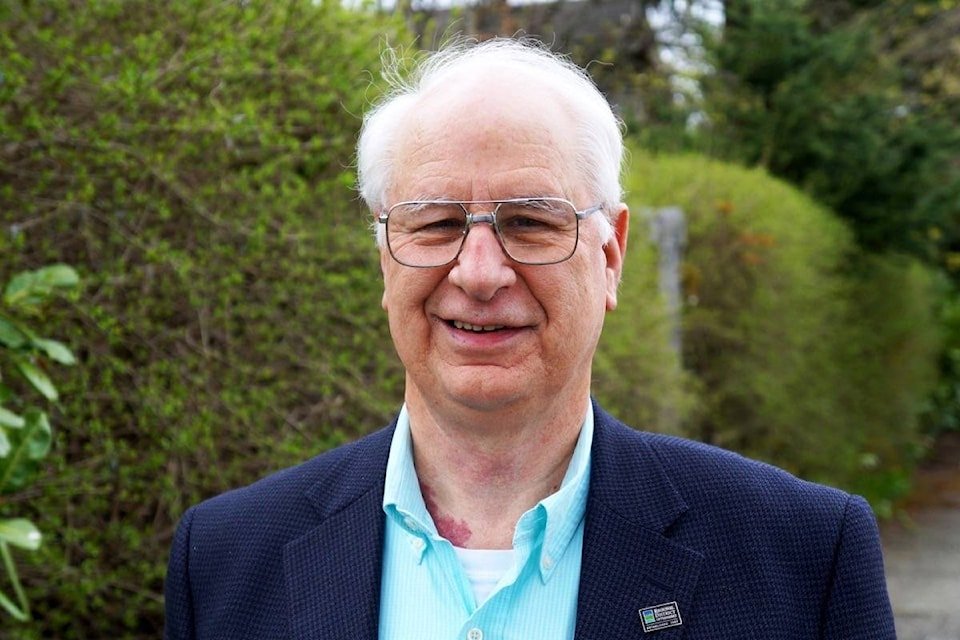Climate scientist says RDN director used an ‘anti-science trope’
Julian Fell, alternate director for the Regional District of Nanaimo’s Electoral Area F, claimed that global warming was “not happening” and is based on what he called “junk science” at the RDN’s recent board meeting on Tuesday, February 13. Photo: Julian Fell, handout.
At the Regional District of Nanaimo (RDN) board meeting on Tuesday, Julian Fell, alternate director for RDN’s Electoral Area F representing Errington, Coombs and Hilliers, claimed global warming was “not happening" and is based on what he called “junk science.”
The RDN board was debating developing a regional strategy for net zero buildings and localized energy generation.
“At the risk of offending every true climate believer I think the whole climate thing is a bit of a fiasco,” he said. “We've been facing this global warming thing now for 45 years and it's not happening.”
As the alternate director, Fell attends RDN board meetings when Area F director Leanne Salter is unable to.
Fell then argued that the science that carbon dioxide emissions affect the climate could be “debunked very, very quickly” claiming that he can measure “back radiation” in his yard.
“I have a radiation meter, and it shows you the radiation has a temperature of -32 degrees,” he said. “That doesn't warm ground that is 35 degrees hotter. The emission frequency of CO2 has a heat content of minus 80 degrees Celsius. That doesn't work.”
Fell concluded by saying “I can only call it junk science”
Dr. Simon Donner is a climate scientist and a professor at the University of British Columbia. He said he smiled when he heard what Fell said at the meeting.
“What the regional director said is an old kind of anti-science trope that I'm surprised to even hear today,” he said. “It's the sort of thing somebody would read online, but that goes against basic principles of physics.”
Donner said that Fell is failing to account for the different types of heat that contribute to climate change and that “you can't make sense of the greenhouse effect just by taking the measurement of the temperature of different things,”
Donner said it takes “really old school cognitive dissonance” to argue against the science of greenhouse gasses causing climate change in 2024.
“When we don't want to take an action, often rather than arguing about the specifics of the action, we go back and argue against the reason you would do it,” he said. “So it's sort of like your parents saying, ‘Hey, could you take the garbage out?’ And then saying, ‘I don't think the garbage is even full’.”
Dr. Erik Krogh, an environmental science professor from Vancouver Island University, agrees that carbon emissions are a key contributor to climate change.
“The connection between greenhouse gasses and global warming is that those gasses absorb those outgoing heat waves, and then they radiate it back in all directions. So they radiate out spherically, some of those come back down to earth, some of those are destined for outer space, some move horizontally in the atmosphere.”
Krogh says the increased amount of heat that is reflected after hitting greenhouse gases is “a core component of the mechanism of increased temperatures, both in the troposphere as well as the Earth itself.”
Donner says that the RDN is right to look at developing strategies to reduce the emissions of new buildings, which he said often ranks number one or two for emissions along with transportation.
“Figuring out how we're going to make our buildings more efficient and to stop relying on natural gas and shifting to electricity for heating is not only the solution for reducing emissions in the region,” he said. “They're also just good ideas anyways, because the next time we get a big heatwave, if we've shifted to electricity for heating, you also get electric cooling.”
Jessica Stanley, director for Electoral Area A, responded to Fell’s comments at the meeting.
“I think that having the science is important,” she said. “If we're going to hear that climate change isn't real, then I think we should hear the evidence that says that clearly, across the board, we've got multiple areas of impacts that I don't think can, or should, be denied.”
The RDN board voted to move ahead with developing a strategy for net zero buildings and localized energy generation with directors Fell, Ian Thorpe and Lehann Wallace opposed.
Funding Note: This story was produced with funding support from the Local Journalism Initiative, administered by the Community Radio Fund of Canada.

